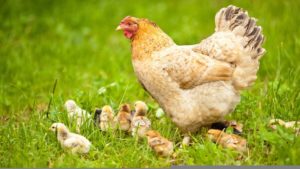Stephan: Here is another door into the past opening, and it is such an elegant study.
The team's research was published in the journal
Molecular Biology and Evolution.
Source: Oxford University Press via
EurekAlert 
A new study suggests that Christian religious practices influenced the evolution of our modern chicken
Credit: Xalanx/Depositphotos
For about 6,000 years, humans and chickens have led an interconnected existence, with the latter serving the former a regular supply of nourishing meat and eggs. Evolving from an Asian species of red jungle fowl, our modern domesticated chicken is remarkably passive, can lay many eggs quickly, and has little fear of humans. But these traits were not always common in the animal, and a team of scientists has recently managed to pinpoint the time in history when chickens went through their major evolutionary shift.
The international research team built its study off previous discoveries that focused on a specific genetic variant that looked to be indicative of selective evolutionary pressures. The thyroid-stimulating hormone receptor (TSHR) is understood to be significant in enabling faster egg-laying and reduced aggression.
Archaeological records have long shown an increase in the volume of chicken bones from the 9th century CE onwards. The research team took these historical records and developed a new mathematical model […]
No Comments
Eric S. Lander and Eric E. Schmidt, president and founding director of the Broad Institute of MIT and Harvard University/ executive chairman of Alphabet, the parent company of Google - The Washington Post
Stephan: Here you can see, from two people who live in the world of technological innovation, what I have been saying for several years, and what I find particularly alarming about the Trump Administration. For most of the 20th century American preeminence was based largely on the nation's leadership in technological innovation.
But whenever the Republicans have been in power and have been the ones to make policy, science funding has suffered. Now with the immigration restrictions one of the main unintended consequences is that science oriented immigrants have stopped coming to the U.S.. To get a sense of what that means consider that 74% of the patents granted in the U.S. last year had at least one immigrant on the patent application, and immigrant entrepreneurs have, in the past, constituted one of the driving forces for innovation.
Because Republicans don't like science, since it often contradicts the fantasies and myths that are so much a part of the Republican worldview, they have gutted research. There are implications, and this essay lays out the case very well.

A DNA double helix is seen in an artist’s illustration released by the National Human Genome Research Institute.
Credit: Handout/Reuters
For more than a half century, the United States has operated what might be called a “Miracle Machine.” Powered by federal investment in science and technology, the machine regularly churns out breathtaking advances.
The Miracle Machine has transformed the way we live and work, strengthened national defense and revolutionized medicine. It has birthed entire industries — organized around computers, biotechnology, energy and communications — creating millions of jobs. It’s the reason the United States is the global hub for the technologies of the future: self-driving cars, genome editing, artificial intelligence, cancer immunotherapy, quantum computers and more.
Our machine is the envy of the world. And yet, while other nations, such as China, are working furiously to develop their own Miracle Machines, we’ve been neglecting ours. Though historically a bipartisan priority, science and technology funding has steadily eroded over the past decade. One example among many: Adjusted for inflation, the budget for […]
3 Comments
Jasmin Fox-Skelly, - BBC (U.K.)
Stephan: There are going to be a lot of unintended unanticipated crises arising from the melting poles and the effects they will have on earth's ecology. Here's one very few people, even in the science community, anticipated.

Ice pool
Credit: BBC
Throughout history, humans have existed side-by-side with bacteria and viruses. From the bubonic plague to smallpox, we have evolved to resist them, and in response they have developed new ways of infecting us.
We have had antibiotics for almost a century, ever since Alexander Fleming discovered penicillin. In response, bacteria have responded by evolving antibiotic resistance. The battle is endless: because we spend so much time with pathogens, we sometimes develop a kind of natural stalemate.
However, what would happen if we were suddenly exposed to deadly bacteria and viruses that have been absent for thousands of years, or that we have never met before?
We may be about to find out. Climate change is melting permafrost soils that have been frozen for thousands of years, and as the soils melt they are releasing ancient viruses and bacteria that, having lain dormant, are springing back to life.




 WASHINGTON — When he was running for office,
WASHINGTON — When he was running for office, 









